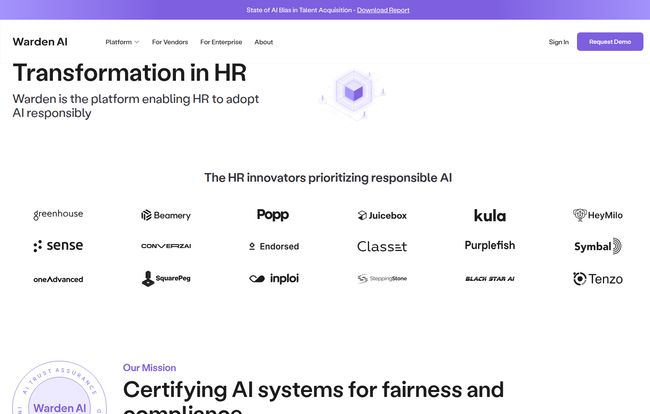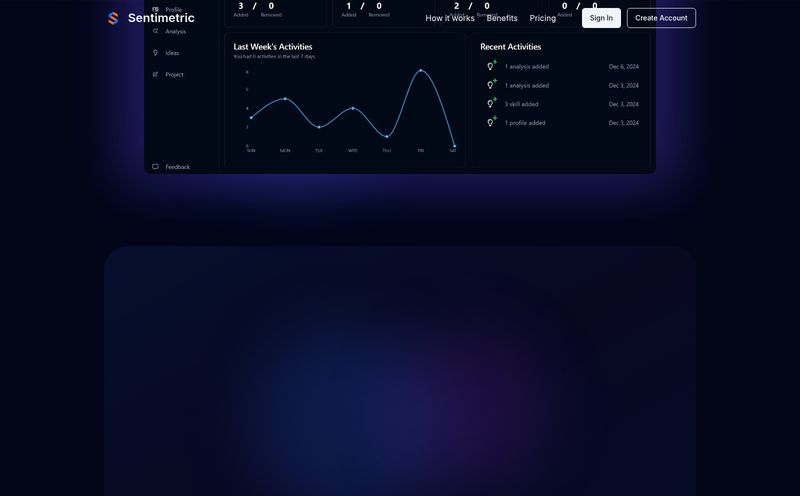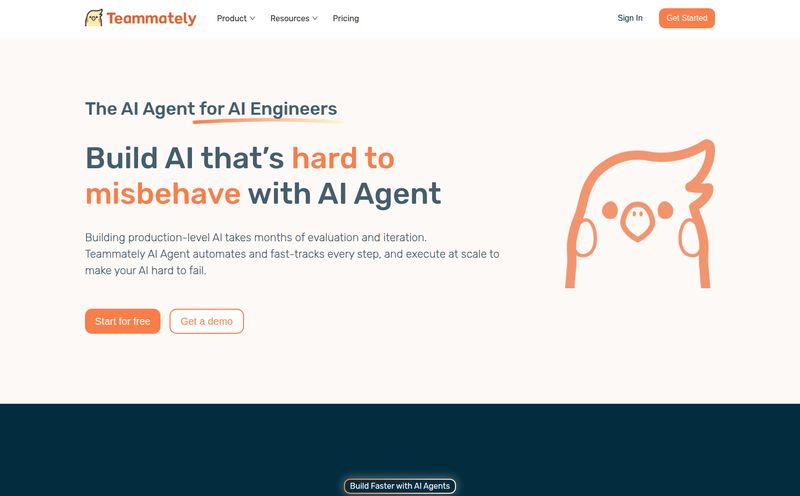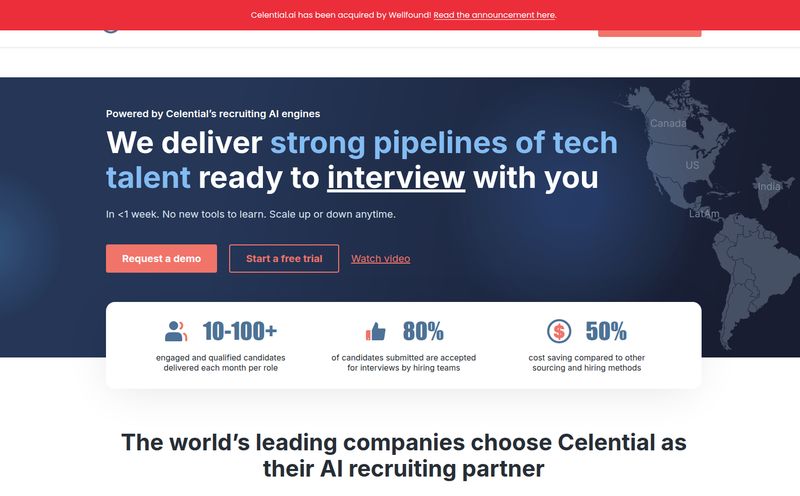The AI gold rush in HR is… a lot. Every platform, every tool, every solution is screaming “AI-powered!” from the rooftops. It’s in our applicant tracking systems, our candidate screeners, our performance reviews. And hey, I get it. The promise of efficiency and data-driven decisions is incredibly seductive.
But there’s a quiet, nervous question buzzing in the back of every smart HR leader’s mind: How do we know this thing isn’t biased?
We’ve all heard the horror stories. The AI that penalizes resumes with certain names, or downgrades candidates who didn't attend a specific type of university. It's the dreaded “black box” problem, and with regulators now paying very close attention (I'm looking at you, NYC Local Law 144), just crossing your fingers and hoping for the best isn’t a strategy. It's a liability.
This is the exact headache that a platform like Warden AI is built to solve. I’ve been watching the AI assurance space for a while, and it's fascinating. These companies aren't building the AI; they're the independent referees making sure the game is played fairly.
So, What is Warden AI, Exactly?
Think of it this way: Warden AI is like a CARFAX for your HR algorithms. It’s an AI assurance platform that doesn’t build the AI itself, but instead provides third-party validation that an AI system is fair, compliant, and trustworthy. They specialize in the HR Tech space, which, frankly, is where the fire is hottest right now.
Their mission is pretty straightforward and based on three pillars that should resonate with anyone in a leadership role: protecting civil rights, enabling accountability, and building public trust. It’s not just about tech; it's about the very real human impact of that tech. When you're dealing with someone's career and livelihood, the stakes couldn't be higher.

Visit Warden AI
The AI Trust Deficit is Real, and It's Expensive
For years, vendors could just say, “Trust us, our algorithm is fair.” And buyers… well, they kind of had to. What other choice was there? But that's changing fast. A biased algorithm isn't just a coding error; it's a potential multi-million dollar discrimination lawsuit, a PR catastrophe that can tarnish a brand overnight, and a fundamental ethical failure.
This creates a huge gap:
- HR Tech Vendors need to prove their tools are responsible. It's becoming a massive sales differentiator.
- Enterprises (the companies buying the tech) need to conduct due diligence and ensure the tools they deploy won't land them in hot water.
And then you have the regulators. The NYC Local Law 144 mandates bias audits for automated employment decision tools. The EU AI Act is coming with its own set of stringent requirements. The days of the AI wild west are officially over. You need proof. You need an audit trail. You need assurance.
How Warden AI Actually Audits the Auditors
So how do they pull this off? It’s not just a guy in a lab coat looking at the code. Their approach seems to be built on a few key ideas that, in my experience, are critical for this to actually work.
Continuous Auditing is a Game Changer
This is a big one. A one-time bias check on an AI model is almost useless. Why? Because AI models drift. They change as they process new data. What was fair on Tuesday might be subtly discriminatory by Friday. Warden provides continuous auditing, which is more like a persistent security monitoring system than a one-off inspection. It means you’re not just compliant at launch; you stay compliant.
It's All About the Data
Warden’s site talks a lot about using “real-world proprietary data” to conduct its audits. This is crucial. Testing an AI with sanitized, perfect lab data is like testing a car on a freshly paved, empty track. It tells you nothing about how it will perform in a chaotic, real-world traffic jam. By using data that reflects the messy reality of hiring, their findings have more weight—what they call “legal-grade evidence.” That’s a term that should make any general counsel’s ears perk up.
Transparent Reporting and a Badge of Trust
At the end of the day, this is all about building trust. Warden provides transparent reports and assurance dashboards. For a vendor, this is gold. You can show a potential customer a third-party report that validates your claims of fairness. It moves the conversation from “trust us” to “here’s the proof.” Just look at their testimonials:
“The team at Remesh rely on us to surface the truth in our data without bias... Warden AI has been a game-changer.”
- Sultan Saidov, Co-founder, Remesh
When you see names like Greenhouse, iCIMS, and Popp on their site, you know they're speaking the language of the industry's heaviest hitters. They're helping these innovators not just build cool tech, but build responsible tech.
Who Needs This? The Builders and The Buyers
Warden AI has smartly bifurcated its offering for the two sides of the HR tech coin.
For the HR Tech Vendors (the builders), Warden is a market accelerator. Getting that third-party assurance certificate is like getting an ISO certification or a SOC 2 report. It’s a stamp of quality that de-risks the purchase for your customers and can shorten sales cycles. In a crowded market, being the provably “responsible” choice is a hell of a competitive advantage.
For the Enterprises (the buyers), Warden is a risk mitigation tool. When you’re looking to buy a new AI-driven recruiting platform, your due diligence process just got a whole lot more robust. Instead of just relying on a vendor’s sales pitch, you can ask, “Are you Warden AI certified?” It provides a standardized, trustworthy signal to help you choose the right tools and cover your own compliance bases. Its a simple way to add a powerful layer of protection.
The Million-Dollar Question: What's the Price Tag?
Ah, the pricing page. Or, in this case, the lack of one. Like a lot of enterprise-grade B2B platforms, Warden AI doesn’t list its prices publicly. You have to “Request a Demo.”
And honestly, that makes sense. The cost is almost certainly going to be custom. It would depend on the complexity of the AI model being audited, the number of systems, the frequency of the audits, and the level of reporting required. Auditing a simple screening chatbot is a different beast than auditing a complex, multi-layered talent marketplace algorithm.
My advice? Don’t be shy. If you're in this space, a demo is probably the only way to understand the potential ROI. And you should be thinking about it as ROI, not just a cost. What’s the price of one avoided discrimination lawsuit? What’s the value of winning a massive enterprise deal because you could prove your AI was fair?
FAQs About AI Assurance and Warden AI
I get asked about this stuff a lot, so here are some quick hits.
- What is AI assurance anyway?
- It's the process of evaluating and verifying that an AI system works as intended, is reliable, and aligns with ethical and legal standards. Think of it as quality control for artificial intelligence, focusing on things like fairness, transparency, and security.
- Why is third-party AI auditing so important in HR?
- Conflict of interest. A vendor auditing their own AI is like a student grading their own homework. A third party like Warden AI provides an objective, independent assessment, which holds much more weight with customers and, more importantly, with regulators.
- Is Warden AI only for HR technology?
- Based on their website and messaging, HR Tech is their primary focus. This is a good thing—it means they have deep domain expertise in the specific challenges of hiring, recruiting, and talent management AI. They're not a generic, one-size-fits-all solution.
- How does Warden AI help with regulations like NYC LL144?
- LL144 specifically requires an “impartial evaluation” or bias audit to be conducted by an “independent auditor.” Warden AI is designed to be that independent auditor, providing the exact kind of analysis and reporting the law mandates.
- Does Warden AI fix bias in my AI?
- Not directly. As an assurance platform, their job is to detect and report on bias, not to recode your algorithm. They provide the diagnosis; your development team provides the cure. This separation of duties is critical for maintaining their independence as an auditor.
- How do I get pricing for Warden AI?
- You'll need to contact their team directly through the “Request Demo” buttons on their website. Be prepared to discuss your specific AI systems and needs to get an accurate quote.
Final Thoughts: A Necessary Seatbelt for the AI Rocket Ship
The integration of AI into HR isn't slowing down. It's a rocket ship, and we're all on it. But launching a rocket without safety checks, without guidance systems, and without a mission control that watches for anomalies is just asking for disaster.
Platforms like Warden AI are that mission control. They are the compliance seatbelt. In the near future, I predict that this kind of third-party AI assurance won't be a “nice to have” for serious HR tech players. It will be table stakes. For vendors, it will be the price of entry. For enterprises, it will be a non-negotiable part of their procurement checklist.
Building trust in AI is the single biggest hurdle to its adoption, and you don’t build trust with marketing slogans. You build it with proof. And that seems to be exactly what Warden AI is selling.
Reference and Sources
- Warden AI Official Website: https://www.wardenai.com/
- NYC Automated Employment Decision Tools Law Information: https://www.nyc.gov/site/dca/about/automated-employment-decision-tools.page
- EU AI Act Portal: https://artificialintelligenceact.eu/



